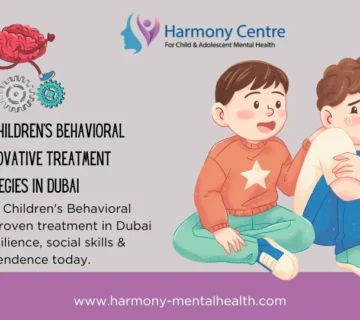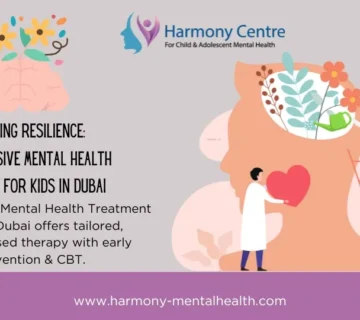Child Anxiety Treatment Dubai: Recognizing Signs and Implementing Effective Interventions
Explore child anxiety treatment in Dubai. Learn how to recognize anxiety in children, discover therapy techniques, and explore professional treatment options to help your child thrive.
In today’s fast‑paced urban environment, anxiety is a growing concern among children. In Dubai, where academic pressures, social expectations, and a dynamic multicultural lifestyle intersect, many young people experience overwhelming stress and anxiety. Recognizing the signs early and implementing effective treatment is crucial for preventing long‑term mental health issues. This article explores child anxiety treatment in Dubai by outlining common symptoms, discussing evidence‑based therapies, and offering practical strategies to help children overcome anxiety and build resilience.
Contact Information
| Contact Method | Details |
|---|---|
| Phone | +971 (52) 8773268 / 04 558 2015 |
| Click Here | |
| info@harmony-mentalhealth.com | |
| Address | Office 409, Building Alrazi-64C, 26th St, Healthcare City, Dubai |
1. Understanding Child Anxiety: Causes and Symptoms
Child anxiety is more than occasional worry—it’s a persistent state of fear or nervousness that interferes with daily life. In Dubai, various factors contribute to rising anxiety levels among children:
- Academic Pressures:
Competitive schools and high expectations can lead to performance anxiety and fear of failure. - Social Challenges:
Navigating friendships, fitting in with peers, and dealing with social media pressures can trigger anxiety. - Family Dynamics:
Inconsistent parenting, family conflicts, or major life changes like divorce can create an unstable environment that fosters anxiety. - Environmental Stressors:
The rapid pace of urban life and constant exposure to digital media may contribute to sensory overload and anxiety.
Recognizing the Signs of Anxiety in Children
Parents and educators in Dubai should be vigilant in noticing early signs of anxiety. Common symptoms include:
- Emotional Symptoms:
Persistent worry, irritability, or fear that is difficult to control. - Physical Symptoms:
Frequent headaches, stomachaches, or changes in appetite. Some children may also experience rapid heartbeat or muscle tension. - Behavioral Changes:
Withdrawal from social activities, reluctance to attend school, or sudden changes in behavior, such as tantrums or clinginess. - Sleep Disturbances:
Difficulty falling asleep or frequent nightmares are often associated with anxiety. - Cognitive Effects:
Problems with concentration, indecisiveness, or a tendency to overthink situations.
Understanding these symptoms is the first step toward seeking appropriate treatment and ensuring early intervention.
2. Evidence‑Based Treatment Approaches for Child Anxiety
Treating child anxiety requires a comprehensive and proactive approach. In Dubai, mental health professionals use various evidence‑based therapies to address anxiety in children effectively. Some of the most common treatment modalities include:
Cognitive Behavioral Therapy (CBT)
CBT is one of the most widely used therapies for anxiety. It focuses on identifying negative thought patterns and replacing them with positive, realistic ones. In a CBT session, children learn to:
- Recognize and challenge irrational fears.
- Develop coping strategies for stressful situations.
- Practice gradual exposure to anxiety-provoking scenarios.
This therapy is structured, goal‑oriented, and has been shown to reduce anxiety symptoms by 30–50% in many cases.
Play Therapy
Young children often lack the verbal skills to express their fears. Play therapy allows them to communicate through creative activities like drawing, storytelling, or role‑playing. This approach helps children:
- Express feelings in a safe, non‑judgmental environment.
- Process traumatic experiences indirectly.
- Build problem‑solving skills through interactive play.
Play therapy is especially effective for children in early developmental stages.
Family Therapy
Since a child’s anxiety is often influenced by the family environment, involving parents in treatment can be highly beneficial. Family therapy focuses on:
- Improving communication between family members.
- Identifying and addressing familial stressors.
- Establishing consistent routines and supportive practices at home.
Family therapy creates a unified support system that reinforces the child’s progress in individual sessions.
Mindfulness and Relaxation Techniques
Mindfulness practices have become a cornerstone of anxiety treatment. Techniques such as deep breathing, guided meditation, and progressive muscle relaxation help children:
- Reduce immediate stress and anxiety.
- Increase self‑awareness and emotional regulation.
- Develop a sense of calm and focus that can be applied in daily situations.
Mindfulness training can be incorporated into therapy sessions and practiced at home to provide ongoing support.
Medication
In some cases, when anxiety is severe and significantly impairs daily functioning, medication may be considered. Pediatricians and child psychiatrists in Dubai might prescribe medications such as selective serotonin reuptake inhibitors (SSRIs). However, medication is typically used in conjunction with therapy, not as a standalone treatment.
3. Tailoring Treatment for Children in Dubai
Every child is unique, and treatment plans must be tailored to individual needs. In Dubai, the diverse cultural and social context adds another layer of complexity to treatment. Mental health professionals at leading clinics use a personalized approach by:
- Conducting Comprehensive Assessments:
Detailed evaluations involving questionnaires, observations, and feedback from parents and teachers help build a clear picture of the child’s anxiety levels and triggers. - Setting Clear, Measurable Goals:
Treatment plans are designed with specific objectives in mind, whether it’s reducing panic attacks, improving social interactions, or enhancing academic performance. - Incorporating Cultural Sensitivity:
Therapists in Dubai consider cultural values and language preferences to ensure the child feels understood and comfortable during sessions. - Using Multidisciplinary Interventions:
Combining CBT, play therapy, family therapy, and mindfulness techniques ensures a holistic approach that addresses all aspects of a child’s anxiety.
This tailored approach increases the likelihood of positive outcomes and empowers children to develop healthy coping mechanisms.
4. The Role of Parents and Educators in Treatment
Effective treatment for child anxiety extends beyond the therapy room. Parents and educators play a pivotal role in reinforcing therapeutic gains and providing a stable support system.
For Parents
- Create a Supportive Home Environment:
Establish consistent routines, set clear expectations, and create a calm atmosphere that reduces stress. - Encourage Open Dialogue:
Talk with your child about their feelings. Active listening without judgment can help children feel safe and understood. - Model Healthy Behavior:
Demonstrate stress management techniques such as mindfulness or deep breathing. Your actions set an example for your child. - Stay Engaged with Therapy:
Participate in family therapy sessions and follow the recommendations of mental health professionals. - Educate Yourself:
Attend parenting workshops or seminars focused on child mental health. This knowledge can help you better support your child’s journey.
For Educators
- Implement Social-Emotional Learning (SEL):
Integrate SEL curricula into classrooms to help students develop emotional regulation and resilience. - Monitor and Support:
Recognize early signs of anxiety in students. Provide a supportive environment and work closely with parents to address issues. - Encourage Peer Support:
Facilitate group activities that foster positive interactions and allow students to share coping strategies. - Provide Resources:
Offer information on school counseling services and mental health programs available in Dubai. - Collaborate with Families:
Regular communication with parents ensures that the strategies used in school align with those at home.
Together, these efforts create a comprehensive network of support that enhances the effectiveness of child anxiety treatment.
FAQs About Child Anxiety Treatment Dubai
Book a Consultation Now
6. Final Thoughts: A Path to Lasting Resilience
Child anxiety can be a challenging condition, but with the right support, children can learn to manage their fears and thrive. In Dubai’s fast‑paced, competitive environment, early detection and tailored treatment are essential for fostering long‑term mental well‑being. By integrating evidence‑based therapies, mindfulness practices, and a collaborative approach involving parents and educators, effective child anxiety treatment paves the way for a brighter future.
Every child deserves the opportunity to build resilience and overcome anxiety. With comprehensive assessments, personalized treatment plans, and a robust support network, children can develop the skills they need to manage stress and navigate the complexities of modern life. By taking proactive steps, families can create a nurturing environment that not only alleviates anxiety but also promotes overall mental wellness.
Investing time and effort in addressing child anxiety today will lead to lasting benefits. As we continue to innovate and expand mental health resources in Dubai, there is hope for every family. Embrace the journey toward better mental health and build a resilient future for your child through informed, proactive care.
👉 Book a Consultation Now: Call +971 4 558 2015 or visit www.harmony-mentalhealth.com.
Join our online community and stay updated with our latest events, articles about Child Anxiety Treatment Dubai



